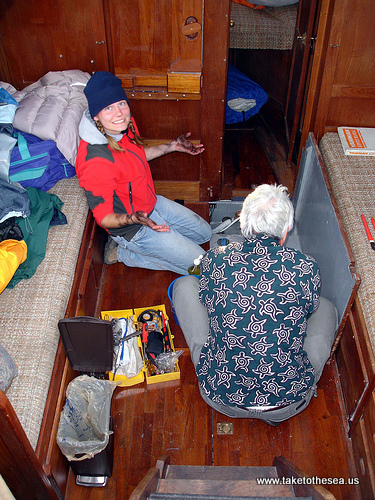Jeff and I recently changed all of our fuel filters – both of our primary filters on each of our fuel tanks, as well as the secondary filter on our engine. With diesel rags on hand, we mop up any accidental spills. When the job was finished our little blue trash pail was heavy with the used filters, some diesel soaked paper towels and rags along with a small cup full of dirty diesel. Top on my list while Jeff was out of town was to find a place to responsibly dispose of these things.
This is a tangent, but when we were in the US we had a small amount of tainted gasoline mixed with oil (for our 2hp outboard engine) that we needed to dispose of (it had been infiltrated by saltwater during our time at Shelter Cove). We diligently carried that jug around with us for hundreds of miles down the US Pacific Coast, inquiring at each port, before we found a place that could accept it. We were amazed at how difficult it was dispose of our hazardous waste in the US (it became it’s own special side mission).
Back to Mexico. I took my little blue bucket with all the soiled filters and rags, along with the little cup of dirty diesel, to the nearby Pemex (gas station) to ask where I could dispose of it. The gas station attendant looked at me blankly, stuck out is hand and indicated with his fingers to hand it over. I passed him the bucket, explaining with great detail the contents of the bucket. He wiggled his fingers again, I passed him the cup and again explained its contents and what exactly I was looking for. With a cocked brow and disinterested gaze, he waited for me to finish talking. He turned, shuffled over to a rusted out trashcan and without a single word emptied the contents of the bucket.
My eyes widened and before I could ask a question or utter a complaint, the contents of the cup were being poured into the trashcan as well. Diesel that settled back into the bottom cup was flung out onto the ground as he walked towards like he was flicking a wet paintbrush. The other attendant took a deep drag from his cigarette. Wiping diesel from his hands onto his uniform, he asked me if I wanted the cup back or if he should throw that away too.
Having worked in the world of environmental cleanup (RCRA, CERCLA, Superfund and the like) I know that even seemingly small spills have an impact on human health and the environment and they cumulate over time to become much bigger (more expensive) problems. I will say that despite the fact that we have a much smaller footprint than we ever did on land, cruising is not always “green,” especially in places that may lack the laws (or enforcement thereof), the societal awareness and the infrastructure to properly handle waste (these places exist in the US as well as Mexico).
Moments like this send me into a tailspin. What is my responsibility as a cruiser to make sure that our hazardous waste doesn’t end up in rusted out trash cans on the side of the road? What should I have done differently? Should I have said something? Was my silence as damning as my passive acceptance of this act? How can I stay true to my environmental convictions in places that may lack the proper support and infrastructure?
The thing is, we always grapple with dirty little deeds – it’s not new or unique to this life, the circumstances are just different.
 The “Deep Shit and Sandwiches Oil Spill of 2008.”
The “Deep Shit and Sandwiches Oil Spill of 2008.”
There is no structure or system for dealing with oily waste … so they just dump it wherever. That will change when someone smart figures out how to make a few pesos hauling waste oil and diesel to a redistillation center. It will take time.